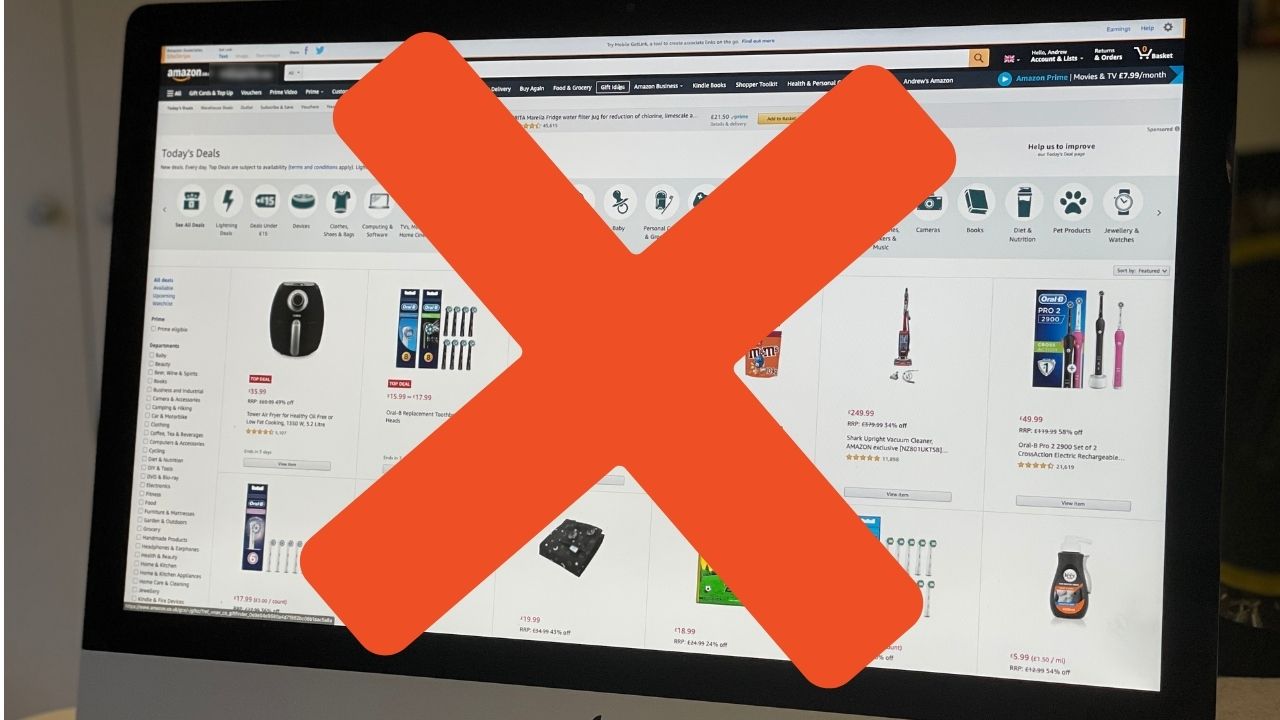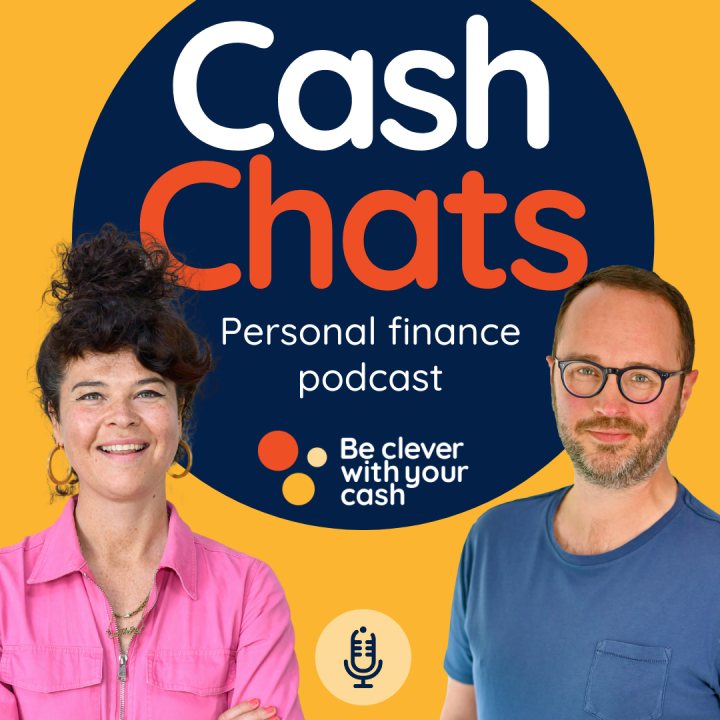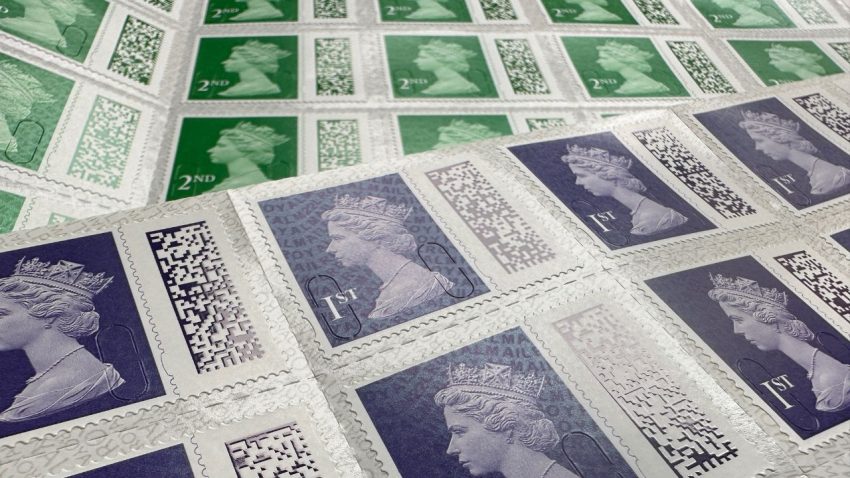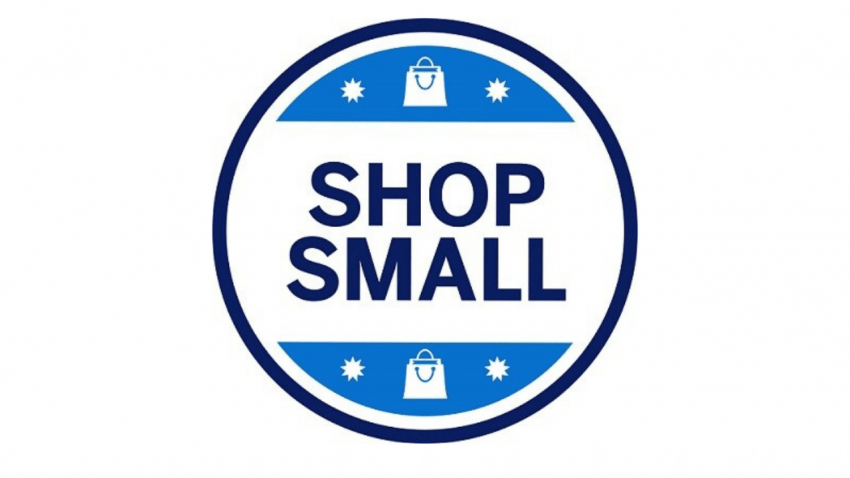From tax avoidance to surprisingly high prices, it could pay to shop less at Amazon. Plus some alternative online retailers you could use instead.
Some articles on the site contain affiliate links, which provide a small commission to help fund our work. However, they won’t affect the price you pay or our editorial independence. Read more here.

Over the last year, I’ve been making a conscious effort to use Amazon less. In all honesty, it’s not been the easiest thing for me to do.
I’m hardwired to hunt down the lowest prices wherever they might be. And often there are some huge discounts and deal stacks at Amazon that make items super cheap.
So I’ve lapsed on a few occasions. Sometimes I’ve forgotten about my boycott and clicked without thinking – a deal for super cheap peanut butter is one I regret! It might have been 50% off the RRP, but in total it was barely a fiver saved.
And there have been a handful of times where the discount was just too tempting – last month I saved £160 on an iPhone 12 Pro (a misprice) and £85 on a Canon lens (a daily deal).
At other times the next day delivery has been a clincher – I realised I needed a case and screen protector for that new phone the day the phone arrived. There was also a gift where it was only in stock on Amazon.
I’m also a Kindle user, meaning any digital e-books I want have to come from Amazon – though I tend to only pick up 99p special offers.
But, despite these purchases, there are dozens and dozens of other items I could have got from Amazon this year where I’ve deliberately chosen to go elsewhere.
I’m willing to spend extra to buy from a different retailer, whether that’s through a higher price or factoring in delivery charges. And in many instances, the difference was minimal or non-existent.
Why am I doing this? There are a few reasons which I’ll outline below. You’ll be familiar with some of them already – but I think a few might surprise you.
Of course, I’m aware you might not care about some of the more ethical points.
You might also not have the luxury of being able to afford to care. Though I can stump up the cash to buy a book at full price, many can’t. So getting the lowest price could be more important to you.
Though personally I’ve been able to get out of the house during the pandemic and visit stores (once they reopened), I know having Amazon Prime was a lifeline for many.
And there will still sometimes be those promotions or discounts that are just so huge it’s hard to say no.
In fact, I don’t think my boycott will ever be 100% either. So elsewhere on the blog I’ll still share with you any standout savings you can make at Amazon.
But anything I can do to redistribute the majority of my spending can only be a good thing.
Here are my top reasons to stop or reduce your spending at Amazon.
Amazon isn’t always the cheapest
A big mistake people make with Amazon, especially if they have Prime, is to assume it’s always the cheapest. Though it can offer big savings, it can also be ridiculously expensive.
Sometimes this is just sellers putting higher prices on Amazon than elsewhere, other times it’s something called drop shipping. This is where a seller lists an item for sale at a set price. When you buy it they then order it from another retailer and get it set to you! Either way, you pay more than you need to.
Really for any purchase you should be comparing the price elsewhere before you add it to your basket.
Here are a few examples I’ve spotted recently:
Lakeland Toaster Tongs
Take these magnetic toaster tongs from Lakeland. We were given a pair and they’re so handy. So we thought they’d be a good gift for a toast obsessed friend. On Amazon they come up at £5.65. But at Lakeland itself, the tongs are £2.99.
Yes you might have to pay postage at Lakeland, but you only get it free with Amazon if you have Prime. Or you might also be able to just pop into a store and get it for more than half the Amazon price.
Ikea lint rollers
Head to Ikea and a refill pack of four Bastis will set you back £2.25. But over on Amazon you’ll pay £6.99.
If you don’t fancy braving the Ikea maze and decide to pay Ikea’s £4 delivery fee, you’ll pay more via Amazon – even if you have the Prime free delivery.
Stamps
A few years back I found out that some shops can charge what they like for stamps. And one place where you’ll get ripped off for for first and second class postage is Amazon.
A pack of 12 1st class would cost you £9.12 from the Post Office or supermarket. This seller has put them on Amazon for £10.49.
You’d pay £7.80 for 2nd class. But I found them on Amazon for £11.47! That’s more than the already overpriced 1st Class stamps there!
Our podcast
Listen to Cash Chats, our award-winning podcast, presented by Editor-at-Large Andy Webb and Deputy Editor Amelia Murray.
Episodes every Thursday.

Amazon try to lock you into their “eco-system”
Amazon Prime is very, very popular. For £79 a year you get free next-day delivery, access to special deals and sales, TV & film streaming and more.
Yes some of these can save you cash, but really the whole point behind Amazon Prime is to get you to make Amazon your number one destination. If you’ve already paid for free shipping, why would you pay again elsewhere?
it’s not just Prime. I mentioned in my introduction that I’ve got a Kindle. If I want to read books on it, I have to buy them from Amazon. Again I’m locked in. I also made the decision early on to go with Echo smart speakers. If I want more of these, or other smart devices, it can often make sense to stick with Amazon.
This essentially reduces your choice and ability to shop around – and therefore get the best price.
Prime makes you more likely to spend money
If you have Prime you’re also more likely to not just shop solely with Amazon, but spend money you hadn’t planned on parting with.
Free and fast shipping is once again the big driver here. It’s so, so easy to buy things this way that it can be addictive. Click. Click. Click.
And those special offers such as Prime Day can encourage you to buy things because of your “exclusive” discounts. If you don’t have Prime, you’re far less likely to spend that cash.
So reduce your time on Amazon and you’ll likely spend a lot less money.
Amazon hurts the high street
Amazon isn’t the only retailer accelerating the decline of the high street, but it is the biggest. During the summer it recorded a sales increase of 37%, thriving during the pandemic while others edge closer to collapse.
Every month more retailers, large and small, announce store closures and profit warnings. They struggle in normal times to compete with the scale and low overheads of Amazon.
If we want our town centres and shopping centres to survive we need to spend more of our money with them – and that probably means at the expense of Amazon.
Amazon is not an ethical company
Finally, the biggest reason to not use Amazon – and the other main motivation behind my reduction in spend.
From the treatment of workers through to tax avoidance, they have a bad rep. A really bad rep. Though others will be doing the same things and some will be worse, I don’t feel we can pretend that Amazon’s abuses of the law and trust justify low prices.
This report from Ethical Consumer details some of the reason it encourages an Amazon boycott.
Get the best of our money saving content every week, straight to your inbox
Plus, new Quidco customers get a high paying £18 welcome offer

 Featured switching deal
Featured switching deal
 Customer rating
3.8/5
Customer rating
3.8/5
- Switch bonus£200
- Offer endsFree gift card ends 27 February
- Extra bonus£25 Amazon Gift Card
- FSCS Protected? Yes
- Switch bonus requirements Switch using the Current Account Switch Service and close your old account within 60 days of starting the switch
- Deposit requirements Deposit £1,500 in the first 60 days from opening the account
- Direct debits transferred over Set up two Direct Debits before or after the switch from a selected list of household bills
- Existing customers? Can't have held any Santander current account on 1 January 2025
- Restrictions Can't have received a switching bonus from Santander already, offer limited to once per person
- Eligible accounts Open a new or hold an existing Everyday, Edge, Edge Up or Edge Explorer current account
- £25 Amazon Gift Card requirements To qualify for the gift card, you need to complete a full switch using CASS, and make five debit card transactions within 30 days of opening the account. Offer ends 3pm 27 February 2026
Alternatives to Amazon
Whether you want to completely cut out Amazon or just reduce how often you use it, I’ve got a few suggestions to help.
Pay for Prime only when you really need it
One way to use Amazon less is to ditch Prime. That way you won’t be tempted to get the value of your membership by using it to shop more and more.
If that’s a step too far, you have options to keep it but pay less. You don’t have to sign up for the full year of Prime. Rather than shell out £79 for 12 months you can pay £7.99 a month.
Obviously that’s more expensive over 12 months, but if you pick and choose particular months – eg ahead of Christmas or around Prime Day – you’ll pay far less.
You can also opt for a £5.99 monthly fee that is just for Prime Video. You can change your subscription in your account.
Support the retailers you love
We’ve seen so many shops disappear over recent years, I’m trying more and more to buy from the ones I’d really miss if they were to do. From small local merchants through to the likes of John Lewis and M&S.
It’s worth seeing if small shops have their own online shop or listing on social media. Or even just call them up. Many are offering click & collect services during restrictions.
For books, one new site worth checking out Bookshop.org which provides a platform for hundreds of independent book shops to earn profit from online sales.
Go to the Amazon sellers direct
You can obviously shop around to find low prices elsewhere, and price comparison sites can help with that. But there’s a trick that could get you the same or similar price to the one you find on Amazon.
When you buy something at Amazon that’s not sold by Amazon, you’ll see the name of another retailer. It’s always worth looking to see if they have their own online or high street shop.






What annoys me about Amazon (not just the tax avoidance thing) is that some things you can’t get without Prime.
I tried buying some hand wipe things, the price seemed reasonable until I clicked on the buy now bit which said it was Prime delivery. Hurredly clicked back to find a non-Prime option only to find there wasn’t one.
I am elderly and diabled and rely heavily upon online shopping. I have had this and other issues with this giant for some time and I’ve been looking for comments about buyers’ experiences with Amazon for a while now. I’m absolutely delighted that I have reached this very helpful site.
Weaning myself away from Amazon isn’t proving easy but I am determined to do so. I’m using the site to find out if a product is available, who makes or retails it and what the correct terminology for it is in order to pinpoint the exact item I want. I then look for it on Google, eBay or another reliable retailer – there are more and more offering online facilities, so it can be relatively easy to find what I want and I’ve been surprised at how many firms factor in free or modestly-priced delivery. It may take buyers a while to motivate Amazon into making the Company a better employer as well as more customer friendly but, reading the content of this site has persuaded me that there are many buyers out there that are determined to make a difference
I always shop around for the best deal for the item i want and am happy to buy from website I have never used before, as long as they are legit (I always do some research), especially if they have a discount code or a ‘new memeber’ sign up deal etc. I used Amazon a LOT more when they were still part of the Nectar scheme and now use eBay a lot more, because they are. If Amazon have a better price/offer free delivery etc then I’ll use them over eBay, but if eBay are offering me triple Nectar points, then they might win – basically do your research and see what you end up paying/earning etc. I have notcied Amazon offering a lot more ‘take x% off this item’ options on goods recently. One thing i always use with Amazon is keepa.com, which outs a prcie tracker on your Amazon product pages, so you can see when prices change – it is VERY interesting. For example i recently bought a 6-way extension lead and it changes with almost clockwork regularity by about £8 in price. I simply set up an alert on keepa to tell me when the next price drop happened and bought it then. Just ouit of interest i didn’t cancel the alert, so it still emails me to tell me when the price changes. Had i not used Keepa I’d have had no way of knowing that they run these price promotions every few days. I have saved a ton this way when buying theings I ‘want’ but don’t need right away.
Another thing I noticed with Amazon during the pandemic and, still to this day – is that it t really isn’t worth me getting Prime. I wouldn’t use the non-shopping features and rarely would ever need for something to be guarranteed next day delivery. I find that the bog-standard free delivery is usually as quick anyway. There have been countless times when i have ordered items for despatch by Amazon (even if from 3rd party sellers) and they say delivery will be in 3 – 4 days and they arrive next day. So why pay more for Prime and get the same service? I have a theory that I can’t prove, but most of my deliveries come in the late afternoon/evening and maybe Prime deliveries get the morning slots? Or maybe it’s just the way the deliveries to my area are scheduled? I fully appreciate that some areas might not get this ‘next day’ service for non-Prime customers, but for people like me in a city, the standard delivery service is generally as good as the premium one, it would seem, so not worth shelling out more. I have tested this theory with friends who have Prime and live in my area. If there’s something we each want, they order it their way and I order it mine and our deliveries generally come the same day or maybe mine is a day later. For me, totally not worth paying more, espcially now i can pretty much choose to work from home and be in for deliveries if i need to.
I am in a dispute with Amazon & probably won’t get my £300 back. Never buy large items from them is my advice and I will definitely be searching for items elsewhere, I’ve already discovered going to companies direct is cheaper.
Amazon don’t care & because they’re so big this is a major issue in any dispute
Just a thought, but whatever anyone thinks of Amazon the corporate, remember that many of the actual sellers on Amazon are just small sole traders like myself, who need platforms like Amazon, eBay and Etsy to scrape a living.
Thanks Andy for sharing this interesting perspective, I totally agree with your statement about protecting the high street and also being locked into their eco-system, which I think is often done in a very sneaky way. I had the experience with Amazon where they tricked me into a subscription. I ordered products online and signed up for Amazon prime without noticing it.
Yeah, it can be easy to accidentally sign up for services, especially Prime!
Amazon is shutting small businesses and retailers down on it’s platform. They shut you down even if you’re making too much money. Amazon has been known to steal the ideas of entrepreneurs. The best site for selling is eBay. Every other platform either costs too much money or is unethical.
.
Surely shopping ethically means never shopping somewhere you think is unethical, not just when it doesn’t cost you very much.
Dear Andy, thank you very much for considering the ethical issues behind where we spend out money. This is an even-handed, thorough and detailed article covering lots of different cons (I mean, of the pros-and-cons variety, but also cons as in con games) about the giant retailer. I think it’s impressive that you present ‘being clever with your cash’ as being about more than just discounts. Bravo!!!
Thanks Kaz, that’s so nice of you to say!
Sorry to get a bit political here but…… UK cannot tackle Amazon tax avoidance single handedly. And yet EU hasn’t tackled the tax problem either. I’mpro-EU in theory but anti- in practice because it just does not get its act together. (just look at the mess over immigration)
I fully agree with the sentiments here. I start off with an Amazon search and then do my very best to find other providers (Argos, John Lewis plus more local businesses) – even if it costs a bit more… because it’s a matter of SAVE UK instead of bolstering profits of stateless international companies.
Amazon will destroy the world – resist by all means possible.
(I do shop/buy at Amazon!!!!)
I also try to significantly reduce Amazon spend in favour of local businesses and companies paying their taxes for the benefit of all of us.
It is the right and necessary thing to do.
Another thing to keep in mind when shopping around for an alternative to Amazon is that you might be able to save a bit more if you go through one of the cashback sites.
Couldn’t agree more with you re Amazon. I’m going through the exact same just now, buying the item direct from seller (often cheaper) where I can.
I will need to rethink the yearly subscription,for Prime, as you say it’s too easy to order from them.
One excellent source for ebooks and audio books is your library service. Maybe you won’t get the latest bestsellers but they have a huge range of titles both modern and classic and it’s all available online.
Yes, they’re great for these – but sadly not Kindle editions.
Also have a look at the Project Gutenberg site. They have a huge selection of free e-books, but only ones whose copyright has expired, which happens after 50 years. Definitely worth a look if you are interested in classic novels.
Thanks Bob
Your kindle doesn’t need to lock you into Amazon.
Take a look at Calibre ebook software (it’s free). It allows you to convert any book format to read on any device (Note PDF conversions are poor, but most ebooks are available in EPUB format which readily converts to Amazon’s proprietary formats of MOBI and AZW).
Oh wow, thanks Tony I’ll check that out
Wholeheartedly agree with everything you say. I try hard to avoid Amazon for all the reasons you give, though Amazon’s power is such that sometimes it is the only sensible option.
I think we need to maintain viable shopping outlets, both physical and virtual, in this country to maintain national income and preserve jobs.
I live in Cornwall and do not have ready access to “high street” for buying most things. So most of my shopping is, necessarily, on-line.
But I see that high streets can and must change from selling primarily, clothes to providing centres where people meet and enjoy themselves – post Covid, of course.
Foods, books, etc., sure, but I’d love to see some fresh thinking about how our high streets can become true community areas.
Of course, this may well require public money which is why it is so important to keep our taxes flowing in and not going into, for one, Amazon’s huge pockets.